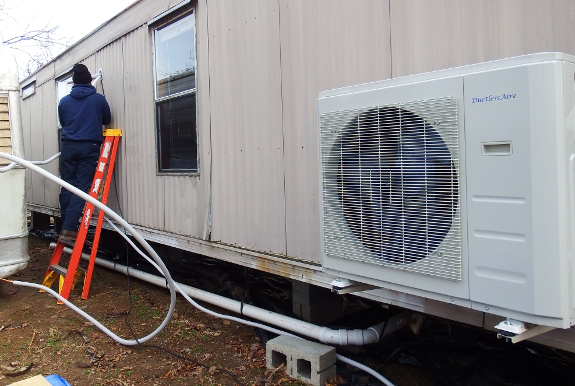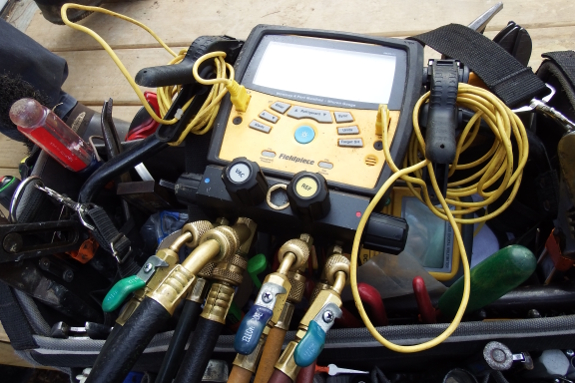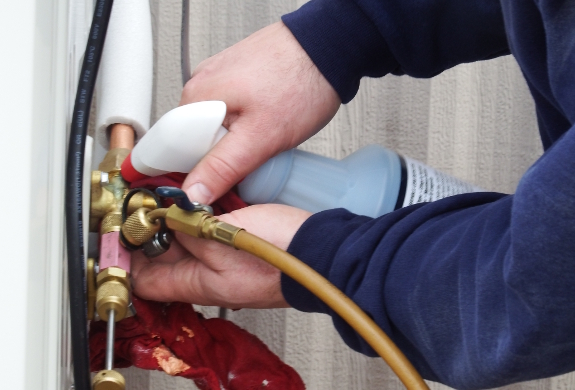
When and how to DIY a minisplit

We learned a huge amount
during our recent minisplit install, and I thought I'd try to sum up
the most salient points in one post to help others who might want to
follow in our footsteps.
First --- is a minisplit
a good idea in a trailer? Most installers told us no because the rooms
at the far ends of the mobile home won't receive uniform heat. We're
used to heating with a wood stove, though, and don't mind using space
heaters at the extremities to top off heat as necessary. We figured the
much higher efficiency of a minisplit compared to a mainstream electric
furnace or traditional heat pump counteract this slight downside and we
still feel that way after enjoying our new device for a few blissful
days.
A slightly more tricky
issue is the potential for water lines to freeze. I hadn't realized
that trailers are designed with air-duct heating in mind, so the water
lines run beside the air lines under the trailer. We'll keep you posted
if this issue materializes and requires an outside-the-box fix.

Next, let's look at the
pros and cons of DIY versus the traditional route of paying to have a
minisplit installed by a pro. After calling pretty much every HVAC
company in the area, I've discovered that a minisplit like the one we got for $1,300 from Home
Depot (plus about $200 in tools, $50 for the wall bracket, and $225 for the
final line work from a pro) would have cost us $5,000 to $8,000 if
we'd gone the traditional route. So, yes, we saved big bucks doing a
lot of the work ourselves.
On the downside, we
won't have the support of a licensed dealership behind us if anything
goes wrong. And it's possible our machine won't be as long-lived as the
Mitsubishi models several of the dealerships in the area are peddling.
Once again, we'll cross that bridge when we come to it. For now, I'm
pretty happy with getting such an efficient model on a shoestring
budget.

Finally, when do I
recommend calling in a pro? A reasonably handy DIYer should have no
problem installing both exterior
and interior
units themselves. Running the lines between them is actually less
tricky than I'd thought as long as you take extreme care with making
bends gently and slowly.
And the connections
(with pre-flared lines like the ones that came in our kit) are less
finnicky than I'd thought. Mark and I went to great lengths to buy
fancy torque
wrenches and get the tightness just right...but our tech finished
the job with ordinary wrenches by feel. Basically, you just want the
connections to be tight.
So what's it worth
paying for? Go ahead and call in an HVAC expert to test the lines with
nitrogen, pressurize them, then release the refrigerant from inside the
unit. First of all, it's illegal to do this step yourself. Second, this
is the tricky part that most benefits from fancy equipment. For $200, a
pro will do it right...assuming you can find someone in your area
willing to work on equipment not their own.
Want more in-depth information? Browse through our books.
Or explore more posts by date or by subject.
About us: Anna Hess and Mark Hamilton spent over a decade living self-sufficiently in the mountains of Virginia before moving north to start over from scratch in the foothills of Ohio. They've experimented with permaculture, no-till gardening, trailersteading, home-based microbusinesses and much more, writing about their adventures in both blogs and books.
Want to be notified when new comments are posted on this page? Click on the RSS button after you add a comment to subscribe to the comment feed, or simply check the box beside "email replies to me" while writing your comment.

I had a friend who lived in a mobile home and heated with wood, the only way he could prevent water lines from freezing was to run new lines inside on the ceiling, problem solved.
I plan to install a couple mini splits in our mobile home and treat rooms as individual zones.
The trend now is to treat crawl spaces like you would a living space, insulated, moisture barrier, and heated or cooled. My hot water tank heat pump is in the basement (which is a seperate zone) and is dehumidified by the heat pump.
Our experience with DIY or "I know a guy" is it can back fire. A few years back our conventional heat pump compressor defecated in it's sleeping place...
The husband of a co worker did HVAC, and did side work. I handed him money and helped install a new outside compressor/condensing unit.
Two weeks later it starts making noise, the reversing valve went bad. It wasn't too cold out (winter in south GA) and we had to wait until he could come fix it as he has a regular job.
That summer the new compressor failed in August. He was deployed on his two week summer National Guard hitch. We stuck a small window unit in the living room and all had to hang out there- it was near 90 in other rooms of the house.
He eventually got it fixed but he got hosed as not being a dealer for the unit they paid him NOTHING for his warranty labor, just supplied the part.
Next time I'll pay the price and get an outfit that can come 24/7 and deal with any issues!